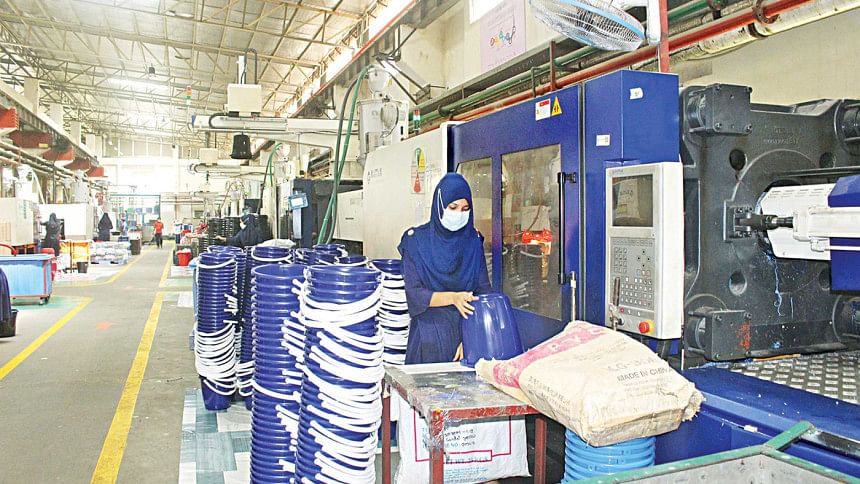Pran-RFL turning plastic waste into new products


Pran-RFL Group, one of the leading conglomerates in Bangladesh, plans to double its plastic recycling capacity to make new products from thrown away items.
Currently, Pran-RFL Group recycles 30,000 tonnes of plastics a year, producing 100 types of new products.
"Plastic consumption will increase, so we will also expand the scope of recycling," said Mohammed Kamrul Hasan, chief operating officer of Pran-RFL Plastic Recycle Plant in Habiganj.
"Our target is to recycle 50,000 tonnes of plastics a year within five years."
He was speaking to a group of reporters during a media tour at the Pran-RFL Industrial Park in Habiganj where new plastic products are being made by recycling waste plastic items.
The group has invested around Tk 320 crore for the plastic recycling project, employing 2,000 people directly and 4,000 indirectly.
The recycling accounts for about 10 per cent of 3 lakh tonnes of plastic products made by the company. The items include household products, pipes and fittings, garment accessories, and food packaging materials.
The company has been recycling plastic products since 2012. It has set up 10 centres around the country to collect used items.
In the recycling factory, there are seven production lines.
Used household items such as broken plastic chairs, wrappers, buckets, and bowls are placed on a machine plate at the factory.
The products are crushed into plastic powder on the other side of the machine. Resin, the raw material used to make plastics, is generated from the powder.
From the resin, 100 types of products, including plastic buckets, chairs, shovels, and flower tubs, are manufactured.
The group collects about 30,000 tonnes of used plastic items every year from dealers, collectors, plastic item producers, and depots at a rate of Tk 60-70 per kg.
About 27,000 tonnes of raw materials are produced from the used plastics.
Had the raw materials been imported, it would have cost the company around Tk 400 crore annually, said Kamruzzaman Kamal, director for marketing of Pran-RFL Group.
"As a result of recycling, a huge amount of foreign exchange is being saved every year."
The group has turned to recycling as part of its social responsibility.
"It is our responsibility to protect the environment," Kamal said.
"We want to produce about 20 per cent of our products through recycling. So, we will set up 10 more collection centres soon."
He said people in many countries feel pride in using recycled products. "We want to reach that stage."
Kamrul Hasan says the use of PET (polyethylene terephthalate) bottle and PET-related packaging is increasing day by day. So, Pran-RFL plans to build a plant to recycle PET bottles in the next two years.
"The management has approved the plan. The staff have been selected. We are buying machinery. Now, we will go for the investment."
Pran-RFL Group is in touch with other countries to know about the machines being invented to recycle new plastics.
"We will use advanced equipment to recycle plastics in keeping with the times," Hasan said.
Recycled products are also being exported. Products needed for gardening are mostly being sold in overseas markets.
In the last financial year of 2020-21, the shipment of recycled products fetched $6 lakh for the company.
In Bangladesh, the use of plastics is rising thanks to their durability, lower prices and availability.
About 24 lakh tonnes of plastic items are used every year, with per capita consumption standing at nine kilograms, way lower than the global average of 60 kg.
There are 4,000 plastic manufacturing companies in Bangladesh that employ more than two million people, directly and indirectly.

 For all latest news, follow The Daily Star's Google News channel.
For all latest news, follow The Daily Star's Google News channel. 



Comments